
NFC, which stands for near field communication, is a short-range wireless technology that allows devices to communicate with each other when they are in close proximity, usually no more than a few centimetres apart. It is a type of RFID (radio frequency identification) technology, but it operates at a much shorter range and at a higher frequency.
NFC is used in a number of applications, including contactless payments, access control, and data transfer. Now even our cars and toll tax barriers use the NFC. The technology is widely used in many devices, including smartwatches and rings, to enable a variety of functions, such as authentication and payments.
NFC-enabled rings can also be used for authentication and payment purposes. For example, an NFC-enabled ring can be used to unlock a door or make a payment by simply holding it near an NFC reader. These types of devices offer a convenient and secure way to conduct transactions and access secure areas.
Nowadays, passports also use NFC for transmitting data to a system containing sensitive information about you. But the daily involvement and dependency on NFC technology raises a concern whether this technology can be problematic for our security? Before getting deeper into its security threats let's see how this technology works.
How NFC works
NFC uses magnetic field induction to transmit data between two NFC-enabled devices that are physically close to each other. When one device, such as a smartphone, is brought near another NFC-enabled device, an electromagnetic field is generated between the two devices. This field allows the devices to communicate with each other and exchange data. One device has a chip with a coil but no power supply while the other is a reader or writer having an antenna and power supply to transmit the data.
The NFC communication involves three main steps:
This story is from the {{IssueName}} edition of {{MagazineName}}.
Start your 7-day Magzter GOLD free trial to access thousands of curated premium stories, and 9,000+ magazines and newspapers.
Already a subscriber ? Sign In
This story is from the {{IssueName}} edition of {{MagazineName}}.
Start your 7-day Magzter GOLD free trial to access thousands of curated premium stories, and 9,000+ magazines and newspapers.
Already a subscriber? Sign In
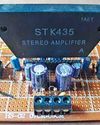
STK435 IC-Based STEREO AMPLIFIER
This stereo AF amplifier uses the STK435 IC, a highly popular choice due to its simplicity.

A SEWER DRAIN SHIELD For Smart Cities
Drainage systems are vital for storm water management but often transport pollutants, especially plastics, to rivers and oceans, harming ecosystems.

ESP32 SPEECH FUNCTION: Text To Speech
Speech capability in technology primarily has two dimensions: text to speech (TTS) and speech to text (STT). This device focuses on TTS.
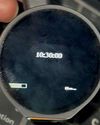
World's Smallest Programable INDUSPHONE DESIGN
This is the second part of designing the world’s smallest phone, where the UI is integrated with the basic functions of the phone.
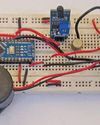
FLAME-SENSING FIRE ALARM Using An Arduino Nano
Fire safety alarms are crucial in both residential and industrial environments.
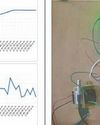
loT-Based Distribution Transformer CONDITION MONITORING SYSTEM
The proposed IoT-based distribution transformer condition monitoring system enables real-time monitoring of distribution transformers, identifying such deviations as overload conditions and overheating.
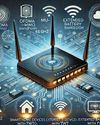
Wi-Fi 6 AND Wi-Fi 7 Powering The Next Wave of Smart Connectivity
Wi-Fi 6 leads with faster data rates and reduced latency while upcoming Wi-Fi 7's backward compatibility will facilitate gradual upgrades from Wi-Fi 6, easing transitions. However, advanced features like multi-link operation (MLO) and ultra-low latency may command a premium, making Wi-Fi 7 suited for high-end applications.

CHARGE FORWARD: High-Voltage Batteries And MSMEs Can Fuel INDIA'S EV REVOLUTION
A nuanced explanation of low- and high-voltage EV batteries by Dr Gokhale, Vice President for Battery Technology at JSW Energy, illuminates their advancements and influence. The essential role of MSMEs and academia in developing a strong EV ecosystem emerges, marking their significance for India's push towards self-reliance in this innovative field.

"MILES TO GO Before I Sleep"
A teacher illuminates the path to success through the light of knowledge, yet some teachers extend that light to society through their contributions and research. Known as the architect of the modern M3 electronic voting machine (EVM) and the voter verifiable paper audit trail (VVPAT) that transformed India's democratic process, Prof. (Dr) Rajat Moona's journey began in the modest town of Bareilly. Here is his story, as recounted to and written by EFY's Yashasvini Razdan.

STARTUPS & INNOVATORS
1 One Charger To Charge All Your Devices | 2 Harnessing AI Technology For Efficient Pest Management | 3 Wireless Light-Based Communication With Velmenni's Technology